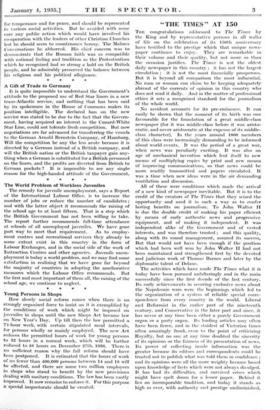" THE TIMES " AT 150 THE congratulations addressed to
The Times by the King and by representative persons in all walks of life on the celebration of its 150th anniversary. have testified to the prestige which that unique news- paper continues to enjoy. They are remarkable in their volume and their quality, but not more so than the occasion justifies. The Times is not the oldest daily newspaper in this country ; it has not the largest circulation ; it is not the most financially prosperous. But it is beyond all comparison the most influential. No man or woman can claim to be keeping adequately abreast of the currents of opinion in this country who does not read it daily. And in the matter of professional' ethics it sets a recognized standard for the journalism of the whole world.
No accident accounts for its pre-eminence. It can easily be shown that the moment of its birth was one favourable for the foundation of a great middle-class newspaper (for it was middle-class before it was aristo- . craw, and never aristocratic at the expense of its middle- class character). In the years around 1800 members Of this class were increasingly demanding to be informed • about world events. It was the period of a great war, when news was peculiarly exciting. It was also an age of mechanical invention which lent itself to new means of multiplying copies by print and new means Of improving communications, so that news could be more readily transmitted and papers circulated. It was a time when new ideas were in the air demanding ventilation and discussion.
All of these were conditions which made the arrival of a new kind of newspaper inevitable. But it is to the credit of the creators of The Times that they seized the opportunity and used it in such a way as to confer lasting benefits on journalism. To John Walter II is due the double credit of making his paper efficient by means of early authentic news and progressive equipment, and of making it independent. It was independent alike of the Government and of vested interests, and was therefore trusted ; and this quality, along with its sound management, assured its success, But that would not have been enough if the position which had been well won by John Walter II had not been maintained and strengthened first by the devoted and judicious work of Thomas Barnes and later by the diplomatic talent of Delane.
The activities which have made The Times what it is today have been pursued unfalteringly and in the main successfully since the first decade of the last century. Its early achievements in securing exclusive news about the Napoleonic wars were the beginnings which led to the organization of a system of reliable special conc= spondence from every country in the world. Liberal and Reformist in the earlier part of the nineteenth century, and Conservative in the later part and since, it has never at any time been either a purely Government organ or a party organ. Its leading articles may often have been fierce, and in the staidest of Victorian times often amazingly frank, even to the point of criticizing Royalty, but no one at any time doubted the sincerity of its opinions or the fairness of its presentation of news. Its power of collecting inside information was the greater because its editors and correspondents could be trusted not to publish what was told them in confidence ; and its opinions were all the more weighty because based upon knowledge of facts which were not always divulged. It has had its difficulties, and survived crises which might have spelt doom for a lesser paper. Behind it lies an incomparable tradition, and today it stands as high as ever, with authority and prestige undiminished.






































 Previous page
Previous page